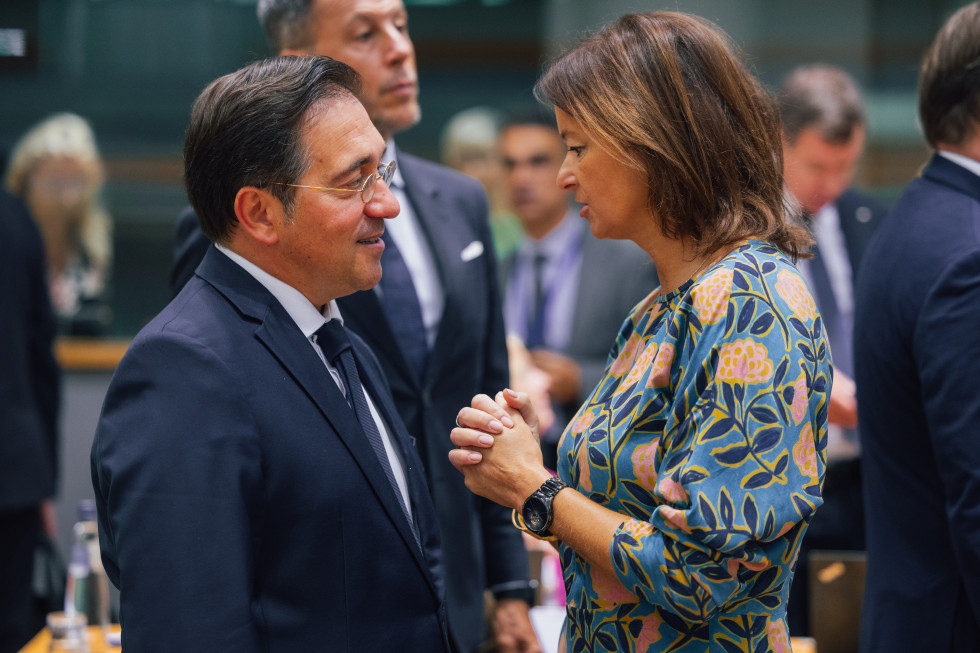Minister Fajon calls for a humanitarian truce to vaccinate Gaza’s children against polio

Minister Fajon at the informal meeting of foreign ministers in Brussels | Author Ministrstvo za zunanje in evropske zadeve
"Any act or attempted act of sabotage on a nuclear power plant is very worrying. We have to renew and strengthen our commitment to the safe operation of civilian nuclear facilities in armed conflict," Minister of Foreign and European Affairs Tanja Fajon stressed in the debate on Ukraine. The meeting in Brussels was also attended by Ukrainian Foreign Minister Dmitry Kuleba, who briefed the Council on the current situation on the ground and presented the country's needs. Minister Fajon reiterated her strong condemnation of Russia's aggression against Ukraine and expressed support for further assistance to Ukraine in its efforts to achieve a just and lasting peace. Slovenia welcomes the organisation of the next peace summit, but efforts must be made to bring both sides to the negotiating table, with greater participation from the countries of the Global South. The Slovenian minister also commended Ukraine’s ratification of the Rome Statute.
Furthermore, Minister Fajon presented the activities planned for the Slovenian Presidency of the UN Security Council in September, when Slovenia will organise a high-level open debate on Leadership for Peace. The month-long Slovenian presidency will focus on conflicts around the world and the protection of civilians.
Over a working lunch with Turkish Foreign Minister Hakan Fidan, EU ministers discussed EU-Turkey relations as well as regional and topical issues, including the situation in the Middle East, Russian aggression against Ukraine and the South Caucasus. The Slovenian minister welcomed Turkey's constructive role in dealing with the consequences of Russia’s military aggression against Ukraine and its humanitarian aid in Gaza. Among other things, she called for continued sanctions against Hamas leaders and the imposition of sanctions upon political leaders in Israel who violate international law. "I strongly condemned Israel's intensified military operation in the West Bank and called for a further tightening of sanctions against Israel," she added and once again called on European partners to follow suit and recognise Palestine as an independent and sovereign state. "Slovenia will continue to be a vocal supporter of an immediate ceasefire in Gaza and an end to the killing of civilians." She stated that "Slovenia has recognised Palestine as a sovereign and independent state, and this recognition is in no way hostile to the people of Israel. Slovenia strongly condemns the actions of the Israeli government led by Netanyahu, which violate international law. We believe that the recognition of Palestine is the only guarantee of peaceful coexistence between Israelis and Palestinians”.
In the afternoon, the ministers were joined by Sigrid Kaag, UN Senior Humanitarian and Reconstruction Coordinator for Gaza, who briefed them on the humanitarian situation on the ground. Minister Fajon called for an immediate, albeit temporary, ceasefire. "Slovenia is deeply concerned about the rising levels of malnutrition and disease, in particular the reported cases of polio. Vaccination campaigns must be made available and implemented to protect children against infectious diseases. Diseases spread quickly. We must do everything we can to protect children," she said and reiterated the need to ensure the smooth and adequate flow of humanitarian aid. The EU must work together to put pressure on Israel to allow the sick and wounded to leave Gaza in order to receive proper medical treatment. Minister Fajon also outlined Slovenia’s efforts to ensure that wounded children will soon be able to come to Slovenia for medical rehabilitation. Since 2009, Slovenia has provided medical care to more than 200 children from the West Bank and Gaza.
The informal meeting in Brussels also saw an exchange of views on the political crisis in Venezuela following the Supreme Court ruling, with Slovenia expressing concern about the situation in the country. Minister Fajon stressed that solutions must come from the region and that the EU must support regional calls.

